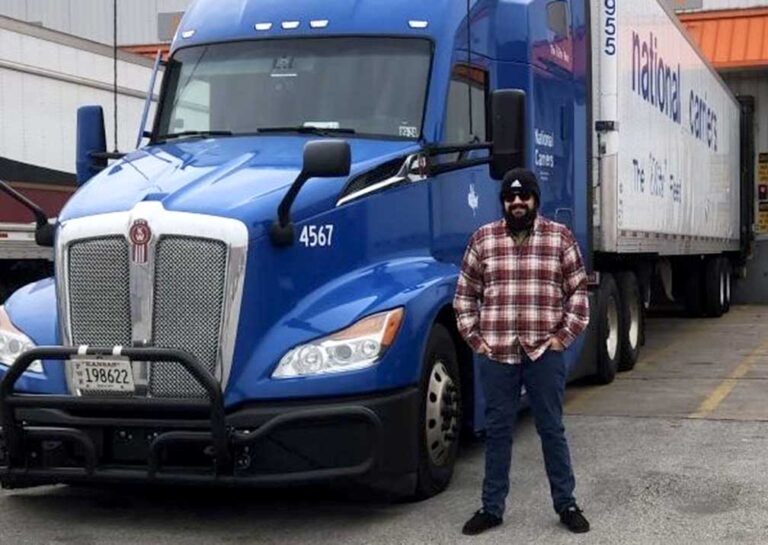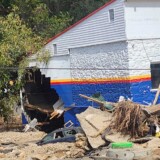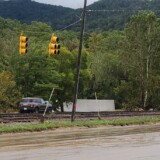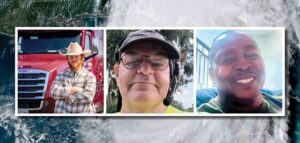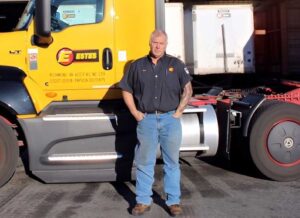
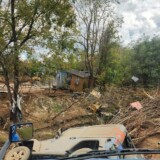
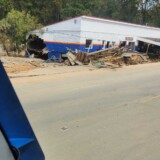
Tristen Utter is going to have to drive trucks for many years to equal the excitement of his first run for Texas-based National Carriers.
In late September of 2024, the Kansas City resident was dispatched with his very first solo load, bound for Black Mountain, North Carolina — where he was welcomed by storms and catastrophic flooding caused by Hurricane Helene.
“The trip should’ve taken three days. I went from Tama, Iowa, to Black Mountain. I did 1,200 miles in two days,” he told The Trucker, noting that he was making good time. “I was going to deliver that next morning and be on my way somewhere else on the third day.”
But, as they say, the best-laid plans often go awry.
“It wound up being two weeks,” he said with a rueful laugh.
Utter arrived in Black Mountain on schedule and parked his Kenworth T680 reefer — loaded with beef — to bed down for the night. He’d have plenty of time to make his scheduled 5 a.m. delivery the following morning … or so he thought.
Utter had already encountered stormy weather on the way in, and he’d been following reports of how Helene was set to make landfall on the Florida coast.
“I had no idea that it was going to be like a full-blown hurricane in the Carolinas,” he said. “I parked in a Dollar General parking lot, and I went to sleep. At 3:30 in the morning, 150-mph winds woke me up. It was literally rocking my truck back and forth violently.
“I opened my curtains,” he continued. “There were shopping carts flying through the air and there was 2 or 3 feet of water on the road.”
Realizing that he couldn’t safely drive through water that deep, he called his dispatcher and reported he wasn’t going to be able to make the delivery on time because of the conditions.
The team at National Carriers offered their full support.
“They were just like, ‘You’re in the middle of a hurricane right now. Don’t go anywhere; just stay there. We’ll call the receiver to see what’s going on,’” Utter said. “Well, the receiver ended up getting flooded and hit really bad. He was a half mile away from me on lower ground.”
For the next 24 hours, Utter hunkered down in his truck and watched as the town’s residents were loaded onto buses for evacuation. Not wanting to abandon his truck, he prepared to ride out the storm inside the cab, despite the locals’ dire predictions of what was to come.
“They said they thought this whole town was going get swept away in the hurricane. I just toughed it out there, and thankfully nothing happened to my truck,” he said. “I started calling people, like my family and stuff, letting them know that I was in the hurricane but that I was OK.”
Before long, conditions were so bad that Utter couldn’t have left the area even if he’d wanted to. The next alerts that reached him were both bad news. One announced that a stretch of Interstate 40 West had been damaged by a landslide and a chunk Interstate 40 East had crumbled under flood waters.
That news, he said, was one of the scariest parts of the experience.
“Right after I got that alert, I got another alert saying the Black Mountain dam was about to break. Everyone was told to evacuate immediately,” he said. “I was trying to Google where this dam was — and all the service went out.
“So, at that point I was pretty scared,” he continued. “I just sat in the front seat waiting for hundreds of feet of water to come sweep me away. That was probably the scariest 20 or 30 minutes of my life before I finally decided that (the dam) must not be close to me.”
The Black Mountain dam held, but the following day the National Guard came around trying to get everyone left in town to evacuate. More heavy rain was expected, and authorities needed to do some controlled flooding to ease the strain on the dam.
“I asked the national guardsmen where the dam was in relation to this high ground because I couldn’t evacuate. I was stuck in a truck,” Utter said. “He just looked at me in the eye, said, ‘I’m sorry,’ and drove off.”
A few minutes later, while on the phone with his girlfriend, Utter saw the wave of water approaching.
“I told her I saw the water coming, and the phone cut out,” he said. “It happened really quick — there was 6 inches of water on the ground, then a foot, 2 feet and 3 feet.”
Utter describes the horror of fearing his truck would be swept into the flooded river.
“I felt the water pulling, moving my truck forward toward the river that was flooded. I got my flashlight out that’s got a window breaker on it and prepared for the worst,” he said.
“I was literally praying to God. I’m a good swimmer and all, but I don’t know if I could compete with flood waters and all the debris in the river,” he said. “As soon as I started thinking I was going to go into the river, the flood stopped, and it sat me back down — a full 80,000-pound truck.”
If he didn’t already realize what a close call it was, surveying the aftermath of the storm underscored just how fortunate Utter had been.
“I ended up walking to the receiver, and there were trucks turned on their sides. There were trucks upside down. There was a day cab stuck in a tree,” he said. “They were sending people into the receiver’s building in boats, like rescue rafts, to pull people out. The building had flooded and then there was an electrical fire.”
Utter had high praise for National Carriers and their support throughout the ordeal, noting that they kept constant tabs on him … as long as power and cell signal held out.
“I was in line to use a National Guard phone, and I called my parents and my girlfriend and let them know I was OK,” he said. “Then I waited in line again to call my company — and the very first thing they said was ‘Are you okay?’
“They were really great through this, the whole thing,” he continued. “National showed that they actually care about their drivers, at least in my experience. They’ve been really great with me.”
One good thing that has come out of Utter’s ordeal is that once a driver has ridden out a hurricane in the truck and lived to tell about it, it’s pretty hard to still call them a rookie, no matter how new to the job they might be.
Asked what he’d offer by way of advice for staying cool under pressure, Utter shared some keen insights.
“You have to have the mindset that literally anything can happen,” he said. “The hurricane was completely unexpected. Even the people in that area were caught off-guard because it was a historic flood in recorded weather history. A full-blown hurricane had never come over the mountains.
“My advice to others is to be totally prepared for things that you would not think would happen,” he continued, adding that he counts himself lucky.
“I had just left for that trip, so I had a month’s worth of food and a week’s worth of water in my truck,” he said. “I’m now a big believer in expecting the unexpected — because sometimes a hurricane will hit a thousand miles inland and nobody will see it coming.”
Dwain Hebda is a freelance journalist, author, editor and storyteller in Little Rock, Arkansas. In addition to The Trucker, his work appears in more than 35 publications across multiple states each year. Hebda’s writing has been awarded by the Society of Professional Journalists and a Finalist in Best Of Arkansas rankings by AY Magazine. He is president of Ya!Mule Wordsmiths, which provides editorial services to publications and companies.

